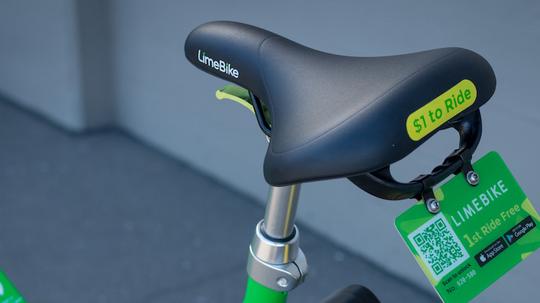
Chicago is introducing a dockless bike-sharing program to parts of the city next week, an initiative that will compete with Divvy, the city’s current and more expensive bike-sharing program that launched in 2013.
Dockless bikes are similar to Divvys in that they are public bikes riders pay to ride in 30-minute increments. However, unlike Divvys, dockless bikes aren’t stored at a bike station. Through a smartphone app, riders can locate bikes and unlock their wheels. And once their ride is over, they can re-lock the bike’s wheels and leave it virtually anywhere in a city.
Chicago plans to introduce the dockless bike program throughout 10 wards on the city’s South Side on May 1 for the six-month pilot program, according to city documents. Bikes will be available between 79th and 138th Streets, Pulaski Road and the Chicago Skyway.
It’s still unclear exactly how many and which bike-sharing companies Chicago is introducing in the new program, but StreetsBlog Chicago reported that LimeBike, a startup based in San Mateo, Calif., will be one of them. LimeBike first came to Illinois earlier this month when it rolled out its service in Rockford. They have more than $132 million in venture capital funding and are currently available in over 50 markets in the U.S., as well as Germany and Switzerland.
Pace, a bike-sharing company based in Cambridge, Mass., is also bringing bikes to Chicago for the pilot program. The company, which currently operates in Albuquerque, N.M., Rochester, N.Y., Knoxville, Tenn., Tallahassee, Fla., and Norfolk, Va., is deploying 50 bikes on May 1 in Chicago, according to a Pace spokesperson.
Besides having the convenience of riding a bike virtually anywhere in a city and not being troubled with finding a docking station, dockless bikes tend to be cheaper, both for the rider and the city.
A LimeBike costs $1 per 30-minute ride, and it’s just 50 cents per half hour for students. Divvy, by comparison, costs $3 per 30-minute trip. Additionally, the infrastructure that comes along with docked bikes gets pricey, too. Cities have to pay for the installation of bike stations, whereas dockless bikes don’t require any investment from a city. LimeBike specifically says it covers all maintenance costs on its bikes.
However, there are downsides. Cluttered sidewalks, damaged bikes and theft have made the service difficult for some cities to adopt. To combat this, Chicago permits are requiring that they still be locked to something at the end of a rider’s trip, like a street sign, bike rack or other outdoor object.
France shut down its first dockless bike-sharing program Gobee after four months, when 60 percent of its fleet “was destroyed, stolen or privatized.” Amsterdam has even gone as far as to ban dockless bikes altogether.








